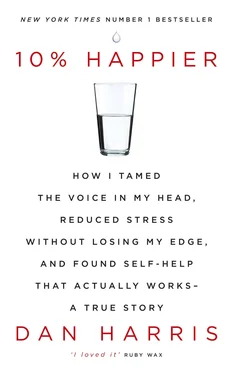The affair gave birth to a thousand snarky blog posts, and it confirmed Americans’ lowest opinions about evangelicals. This was, after all, a man who described homosexuality as a sin, as a “life that is against God.” My gay friends were eating it up—Wonbo being one notable exception. He never once crowed. Like me, he seemed surprised and a little saddened. We both agreed that, while Ted was clearly guilty of towering hypocrisy, there was also some poignancy to the fact that the moral teachings associated with his faith had forced him to suppress a fundamental part of who he was. We covered the story aggressively, but we also took pains to point out that Haggard was much less strident than many of his co-religionists on the issue of homosexuality. In fact, he had once assured Barbara Walters in a prime-time interview that gays, too, can go to heaven.
Throughout the crisis, I had been calling and emailing Ted repeatedly. No reply. The guy who used to get back to me within seconds had gone completely dark.
After a few days, the story died down, as it always does. America, as then senator Barack Obama had noted after Hurricane Katrina, “goes from shock to trance” faster than any other nation on earth.
As Ted’s world fell apart, mine was getting much better. Just weeks later, Bob Woodruff told me he wanted to set me up on a date. Not two years after surviving a bomb blast to the head in Iraq, Woody—as he was known to his friends—was playing matchmaker.
At first I was skeptical. I wasn’t enthusiastic about being set up—to me it seemed slightly pathetic—but it was hard to say no to an American hero, a guy whose story was turned into a bestselling book, and who was greeted by Jon Stewart during an appearance on The Daily Show with the question, “Why are you still more handsome than me?”
Bob’s wife, Lee, an effervescent and hilarious blonde, was hard to refuse as well. Here’s how she laid out the whole setup situation: “Her name is Bianca. She’s beautiful, she’s a doctor, and you’re an idiot if you don’t do this.” This Bianca was, per Bob and Lee, an internal medicine resident at Columbia University. The Woodruffs were friends with her parents, and what could I do? I said yes.
On the night prearranged for the date, I was walking out of the gym on my way to the restaurant when my phone rang. It was Bob, calling to make sure I wasn’t flaking out. “Dude,” he assured me, “she’s hot.”
We were meeting at an Italian spot on the Upper West Side. Pathologically punctual, I showed up early and staked out a spot at the bar, near a pair of bankers from New Jersey doing shots. It was mid-December and the place had festive decorations and a holiday feel. My plan was to lean against the bar, staring at my BlackBerry, so that when Bianca walked in, she could come over and tap me on the shoulder and I could look up all cool and nonchalant. Of course, I was too nervous to pull that off and ended up staring anxiously at the door.
Minutes later, when she appeared, my internal reaction was similar to the one my cousin Andy described the first time he met his future wife: “I’ll take this one.” Bob had not exaggerated; she was beautiful, with golden hair and piercing, light blue eyes—like a husky’s, but much softer. As I did whenever I was confronted with anyone I found intriguing, I peppered her with biographical questions. She was raised in Manhattan. Her dad was a doctor, her mom an artist. She was six months out of medical school and in the hellishly stressful first year of residency. She was also, as I learned over the course of the evening, smart, passionate about medicine, humble, optimistic, quick to laugh, and a lover of animals and dessert. Pretty soon, we were doing tequila shots with the bankers.
Drinks turned into dinner. The first date turned into a second. Three months later, Bianca moved into my apartment. (On the day we brought her stuff over, I marveled at the affable yet unyielding diplomatic skills she employed to convince me to give up 60 percent of my closet space.) Two months after that, we adopted cats. When we called my parents to ask them to provide a character reference for the assiduous pet-vetters at the ASPCA, my father—who aside from being a worrier is also a wiseass—asked whether we were also going to have a commitment ceremony. The cats immediately became the butt of jokes among my male friends at work, who automatically associated felinity with femininity (ignoring historical cat-loving avatars of machismo such as Ernest Hemingway, Winston Churchill, and Dr. Evil). When Chris Cuomo heard about our pet adoptions, he sent me an email that read, “Do u sit when u pee?”
As a man who was a mild hypochondriac, it was handy to have a doctor around. More significantly, after living alone in my apartment for nearly a decade, I found it wonderfully strange to get back into bed after a middle-of-the-night trip to the bathroom and see three cats and a human form lying there, all of whom now had equal claim to the territory.
Bianca truly brought out the fool in me. I had never been this comfortable around anyone before. I would march around the apartment, a displeased feline under each arm, singing songs. I would make up ridiculous nicknames for them. When she was in the living room trying to work, I’d use the Remote app on my iPad to blast Steppenwolf and then lie there with a stupid, twisted-up grin as she burst into the room, tut-tutting about the interruption.
I was beguiled by the contrasts. This was a woman who subscribed to The New England Journal of Medicine , and also Us Weekly . She looked great in both scrubs and cocktail dresses. She could work a thirty-hour shift—during which she would perform chest compressions, manage ornery colleagues, and comfort grieving families—then come home, take a nap, and cook her grandmother’s sauce and meatballs. When I went away on work trips, I often arrived at my destination to find that she had packed snacks and a mash note in my suitcase.
I’d never been in love before. I’d long had a nagging fear that maybe I was too self-centered to ever get there. Everyone always said you’d “know,” but I never “knew.” Now, all of a sudden, I did. It was a giant relief to sincerely want what was best for Bianca—to worry about her life and her career, rather than just fixate inwardly. Selfishly, I felt she was both a smarter and kinder person than I was, and that being by her side might make me better.
Sorting out my romantic life after decades of often aimless bachelorhood was like scratching a huge existential itch. On the downside, though, it left me free to concentrate all of my neurotic powers on work. Bianca pointed out that I would sometimes come through the door at night scowling. “What’s wrong?” she’d ask. “Nothing,” I’d mutter, then make a beeline for the couch, turn on the television, and launch into a harsh postgame analysis of my latest story. It was hard for her not to take my occasional gruffness a little personally. More than that, she hated seeing me gloomy; she had a doctor’s urge to cure and a sense of sadness and frustration that she couldn’t.
It was not as if she didn’t understand and sympathize with the “price of security” stance. This was a woman who had graduated at the top of her med school class, was in an elite residency program, and who still felt she had more to prove than anyone else. She, too, would come home frayed, but—fairly or unfairly—the very nature of Bianca’s anxiety would make me feel superficial by comparison. She would cry over her patients’ pain or loss, whereas my complaints often involved a colleague getting a story I wanted, or questions about whether I’d handled myself well during a contentious on-air interview.
From Bianca’s point of view, though, perhaps the most annoying part of my work fixation was my unnatural attachment to my BlackBerry, which I kept within reach during dinner, on the couch as we watched TV, and on my bedside table all during the night. She’d catch me glancing at it in the middle of conversations and shoot me a j’accuse look. She did eventually convince me to at least move the offending instrument, and its charger, to the other side of the bedroom while we slept.
Читать дальше












